Topics covered in the Standard include safety case construction, risk analysis, safety-relevant aspects of the design process, testing, tool qualification, autonomy validation, data integrity, human-machine interaction (for non-drivers), and life cycle concerns, metrics, and conformance assessment. Security is addressed as a requirement, but details are currently outside the scope of the proposed Standard.
Conversely, UL 4600 does not cover performance criteria or define pass/fail criteria for safety; nor does it benchmark the road testing of prototype vehicles. The standard does not set acceptable risk levels nor set forth requirements for ethical product release decisions and any ethical aspects of product behavior.
UL 4600 remains technology-neutral, meaning that it does not mandate the use of any specific technology in creating the autonomous system, and it also permits design process flexibility. Furthermore, it covers validation of any machine learning-based functionality and other autonomy functions used in life-critical applications.
Compliance with UL 4600 permits (but does not require conformance to) other safety standards such as ISO 26262, ISO/PAS 21448, IEC 61508, MIL-STD 882, etc., as well as security standards where such conformity is demonstrated.

- JCT was Initiated in 2003,and has been established since 1990.we have been working on certification and testing for over 15+ years experience.
- More than 500 customers choose JCT’s Service, we JCT get more than 1000+ certificate for customers,and save many times and money.Also helped customers get more orders.
- We are confident that the job will be completed to your satisfaction. If for any reason you are not fully satisfied with the results, we will fix the issue and won’t consider the job done until you have a smile on your face!
- Don’t worry about hidden charges at the end. We present you with fixed rate pricing before any work even begins, so you will know exactly what to expect. What we quote is what you can expect to pay nothing more.































